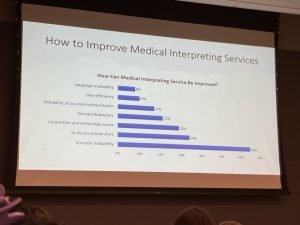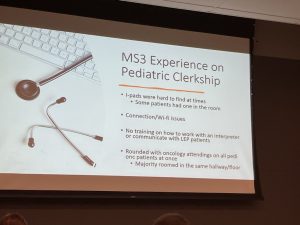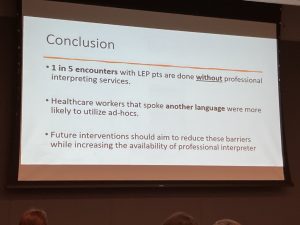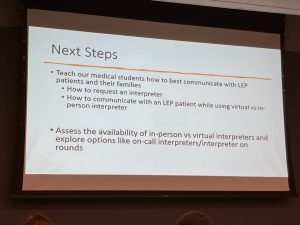I was in Houston attending the (April 5–6) CCHI and University of Houston-Downtown (UHD) event, the 2nd National Healthcare Interpreter Certification Summit & Symposium on Language and Health. It was two events combined, and each featured excellent content.
Improving medical interpreting services
The discussion session, Health Professionals’ Perspectives on Medical Interpreting Services, reaffirmed much of what we already hear about working with healthcare interpreters. The presenter was a third-year medical student, and she talked about her experiences at a leading teaching hospital.
Some of the key takeaway points:
- We need more trained interpreters. Some clinicians recognize the benefits of properly trained interpreters, but the limited number means service is often not available. Other clinicians don’t understand that speaking a language isn’t the same as the capability to interpret, so children or whoever else are used (i.e., ad hoc interpreters).
- Interpreters need to be accessible—virtual and on-site interpreting (OSI) each have challenges. More work needs to be done to improve technology and continue developing professional standards.
- The health system is financially stressed, and this means that money is short and that people/doctors/nurses etc. are being scheduled tightly, with little spare time. There’s little time to learn about languages, cultures, or better solutions. These factors combined with the existing imperfect understanding of professional interpreting lead to bad outcomes.
The profession of interpreting is still being developed. So many assume they understand the role of the interpreter, but the understanding is commonly simplistic, incomplete, and overall inaccurate. There are certainly bright spots, and we need to celebrate these successes and continue to educate, inform, and advocate.
What you can do
Be sure to follow the standards of practice—model the correct behaviors, reliably follow proper protocols, and help create an understanding that interpreters are professionals, a key part of the healthcare team. Encourage others to get trained and pursue certification. There are substantial efforts underway to increase funding—but lawmakers are looking for standards to be in place.
Working together, we can make a difference.
Richard Antoine, MIB/MBA
Executive Director, InterpreterEd.com







